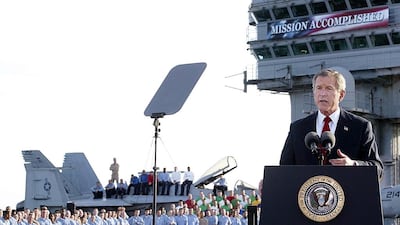On May 1, 2003, George W Bush stood triumphant on the tarmac of the US Navy’s mighty aircraft carrier Abraham Lincoln. In a speech televised to the United States and the world, the president announced, against a backdrop emblazoned by the words “Mission Accomplished”, an end to major combat operations in Iraq.
Iraq had crumbled in the face of America’s campaign of “shock and awe” – an extraordinary demonstration of overwhelming military force. The campaign was a “cake walk”. All that was left was to put the country right, secure Washington’s favoured position there and get out of town.
That day, as Mr Bush basked in a real yet deceptive victory, could there be any doubt about his words or the absolute effectiveness of American military deeds? Did anyone imagine that, more than a blood-soaked decade and untold billions of dollars later, America would still have boots on the ground, and that its "victory" would look as unfinished and ill-starred as it does today?
Once again the spirit of impending triumph and a welcome end to America’s overlong stay in the Land Between the Two Rivers is emerging. Americans are fantasising about victory in the upcoming battle for Mosul. Just as it was on the “Highway of Death” in 1990 and the road to Baghdad in 2003, we are assured that America’s departure from Iraq and the path to a lasting American victory is about to open.
Secretary of defence Ash Carter doesn’t just want to defeat ISIL on the battlefield. He insists on an ideological victory, declaring that “it’s important that we destroy the fact of and the idea of an Islamic state”.
Absolute victory on the model of the enemy’s unconditional surrender, but accomplished quickly and without American casualties, is the defining, if ever-illusive aspiration of the Obama administration.
“Enemy resistance is beginning to crumble,” explained a confident Lt Gen Sean MacFarland, commander of combined joint task force Operation Inherent Resolve, in August. “You don't hear the word ‘stalemate’ any more.”
If there are any problems, we are assured, it is that the campaign’s “remarkable progress” is moving too fast in Washington’s favour.
The defeat of ISIL in Mosul is all but taken for granted.
Gen McFarland’s Central Command commander, Gen Joseph Votel, added his critical voice to the chorus. In recent remarks, he cautiously acknowledged: “I know I’m giving the impression that when we finish with Mosul or Raqqa that we’re done. We are at a point here where we are ... really into the heart of the caliphate. We are moving into Mosul. We are moving towards ... Raqqa here, very, very soon.”
After this pep talk you can almost be forgiven for seeing the seductive light at the end of the tunnel – or, for those who have any association with Iraq in the past few decades, the blinding lights of an oncoming train.
With a breathtaking absence of irony, Gen McFarland said: “The turning point in Operation Inherent Resolve … was the most recent liberation of Ramadi earlier this year, just as it was a turning point in 2006 during Operation Iraqi Freedom.”
Wait a minute. Did Gen MacFarland refer positively to the fact that a long and bloody decade after the first turning point in America’s war, Washington has returned to the very same starting point? Spinning in circles is now defined as progress in ending an endless war.
For US policymakers and the military establishment, the attraction of a clean, unambiguous victory instead of the defining but unrewarding “long slog” that has been Iraq since 1990 remains compelling.
Warming to this theme of victory in progress, McFarland invokes the father of what is regarded as the greatest military victory of all time: Britain’s Winston Churchill.
“To paraphrase Winston Churchill,” he said, “the liberation of Ramadi was the end of the beginning of the campaign against ISIL. The beginning of the end will be the liberation of Mosul, Iraq's second-largest city. Once it is recaptured, the enemy in Iraq will be reduced to scattered pockets of resistance and that is now our focus.”
But shamelessly cribbing Churchill’s inspiring language will not bring about the unconditional surrender of America’s enemies. Those who can summon the imagination to see Iraq in those unachievable terms are bound to be disappointed.
In 1914, Churchill initiated the British purchase of a controlling stake in the Anglo-Persian Company, a move that established the strategic rationale for the British occupation of Iraq during the First World War and its eventual rule as an internationally sanctioned Mandate Power for decades after.
Americans, unlike the British, have always been in a hurry when it comes to Iraq. The mandate system lent a veneer of legality to foreign occupation measured in decades and established a framework for “nation building” that Britain embraced with vigour and a commitment that spanned generations. In contrast, Washington has always been in a hurry to get the job done.
However improbably, Iraq has been at the top of the Washington foreign policy agenda since 1980. Washington, its institutions and public opinion are geared for quick, unambiguous victories. The problem is that these clear-cut victories never materialise, but instead vanish into the fog of continuing war.
Geoffrey Aronson is a scholar at the Middle East Institute in Washington, DC

